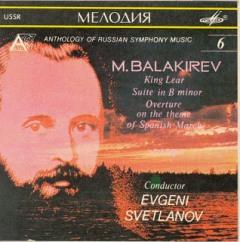Mily Balakirev – King Lear-Suite in B minor-Spanish March (1991)
Mily Balakirev – King Lear-Suite in B minor-Spanish March (1991)

King Lear, Music for W. Shakespeare's tragedy 1. Overture 2. Procession 3. Entre'acte 2 4. Entre'acte 3 5. Entre'acte 4 6. Entre'acte 5 Suite in B minor 7. Preambule 8. Quasi-Waltz 9. Tarantella 10. Overture on the theme of [a] Spanish March USSR Symphony Orchestra Evgeni Svetlanov, conductor Released by the Svetlanov Foundation
The evolution of concert music in Russia and Eastern Europe during the late nineteenth century can be understood as governed by a continual tension and uneasy symbiosis between Western European influences and the desire by composers to develop a distinctly national musical idiom. At stake in the case of Russia was a struggle among artists and intellectuals over the soul of the nation as essentially either Western or Eastern. Balakirev was perhaps the most formidable and influential of Russia’s unusual group of late nineteenth-century composers. His works range from the relatively obscure Incidental Music for King Lear, originally written in 1858, the overture of which opens this program, to more famous later works such as Islamey, the “oriental fantasy” for piano. Balakirev attempted to utilize the formal procedures of Schumann and Liszt and also integrate so-called “folk” elements, not only from his native Russia, but from Bohemia, Poland and Spain. Other Russian composers, such as Tchaikovsky, Mussorgsky and Rimsky-Korsakov, who also struggled to reconcile the Russian with the Western European, were profoundly influenced by Balakirev. His orchestral music, particularly the two symphonies in C and D minor, and his many overtures are all too rarely performed. This work was inspired in part by Vladimir Stasov, the influential critic and composer. The choice of a Shakespeare text was not arbitrary. During the second half of the nineteenth century, in part to demonstrate that the language and culture of the Slavic peoples were in every sense the equals of the German and French, translations and productions of Shakespeare became immensely popular. Since Shakespeare had been appropriated by the French and German in translation, nationalist intellectuals used Shakespeare to demonstrate that Slavic languages (often looked down upon by snobs and aristocrats as culturally inferior) could transmit the English original of the world’s greatest playwright just as well as German or French, whose claims to cultural universalism and cosmopolitanism seemed more secure. Not surprisingly, many nineteenth-century Russian and Czech composers were eager to write symphonic music designed to accompany or evoke popular nationalist productions of Shakespeare’s plays. In this overture, Balakirev uses a distinctly Russian sound but develops the material along conventional, Schumann-like structural lines. The result is a rich, robust, and economically-organized musical drama. The thematic contrasts, the color and pace of the work transmit the grandeur and pathos of Shakespeare’s tragedy. ---Leon Botstein, americansymphony.org
download (mp3 @320 kbs):
uploaded yandex 4shared mediafire mega solidfiles zalivalka cloudmailru filecloudio anonfiles oboom








